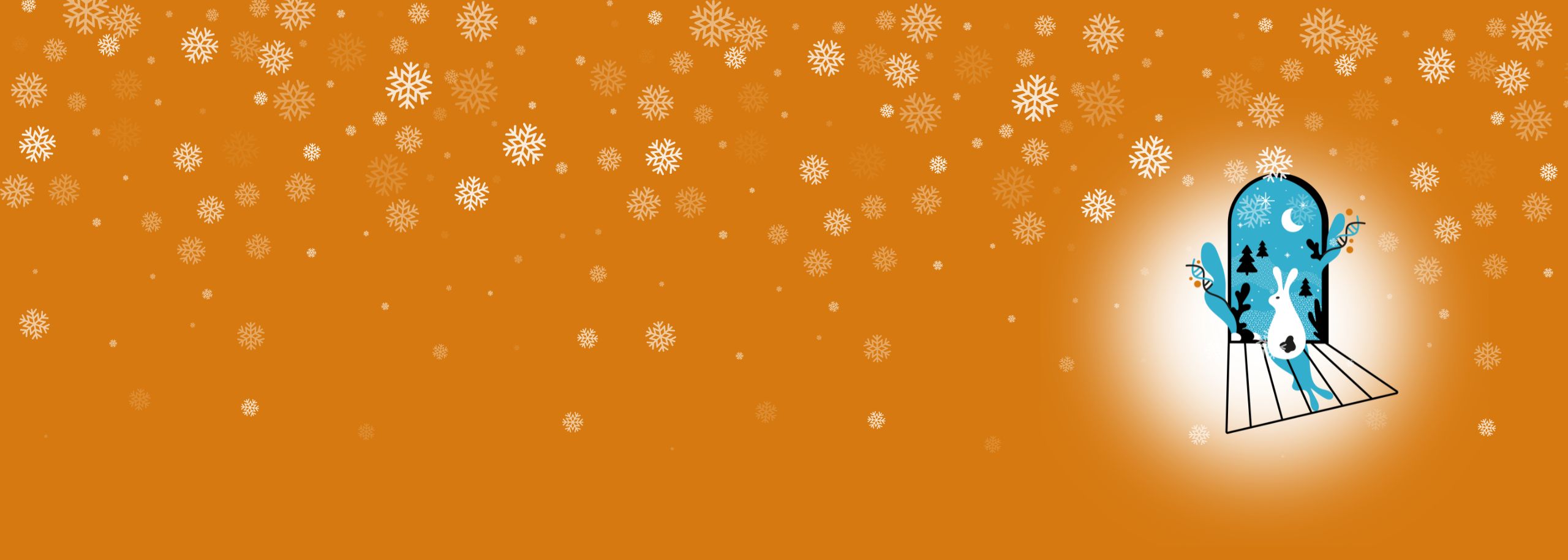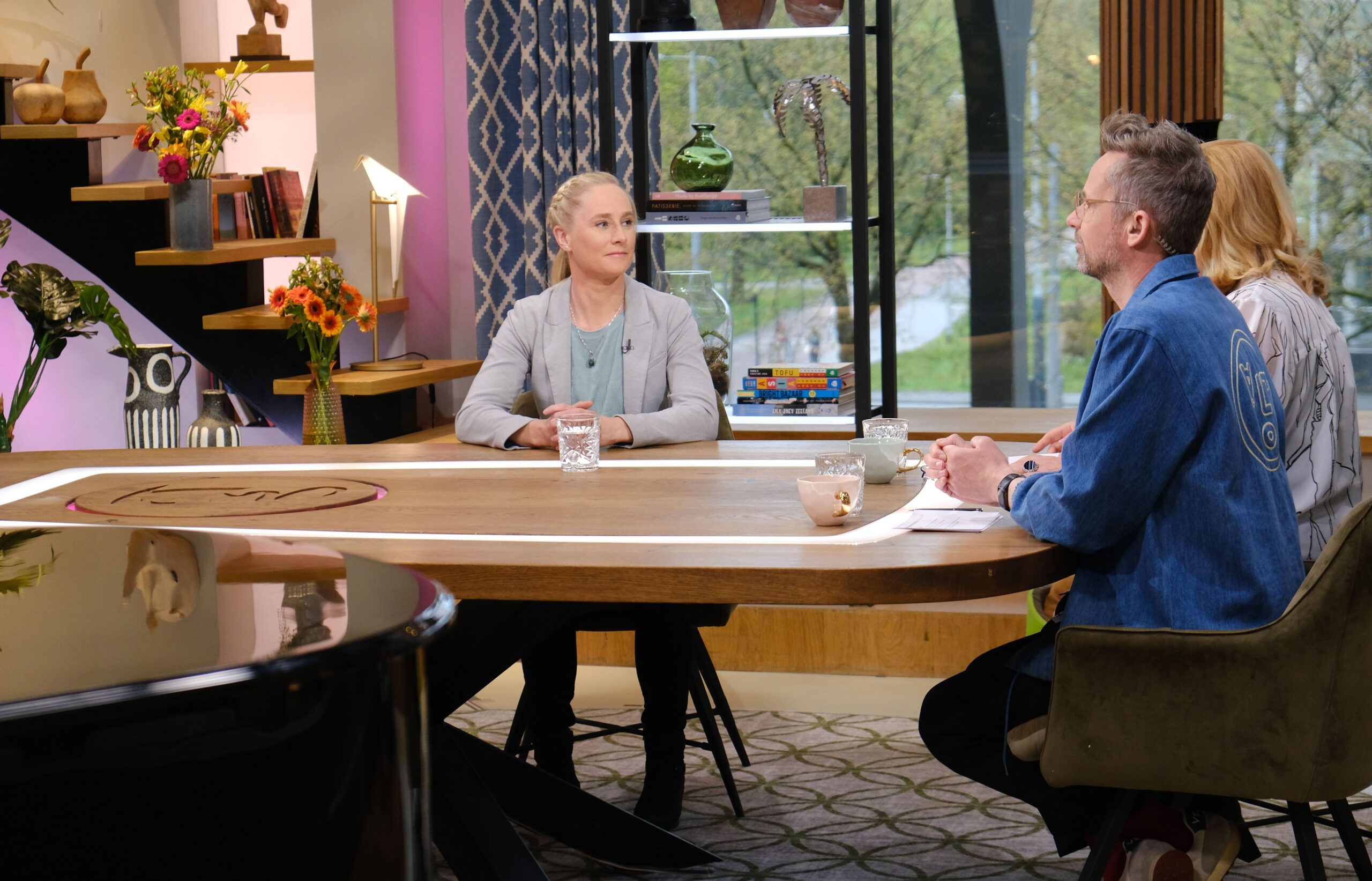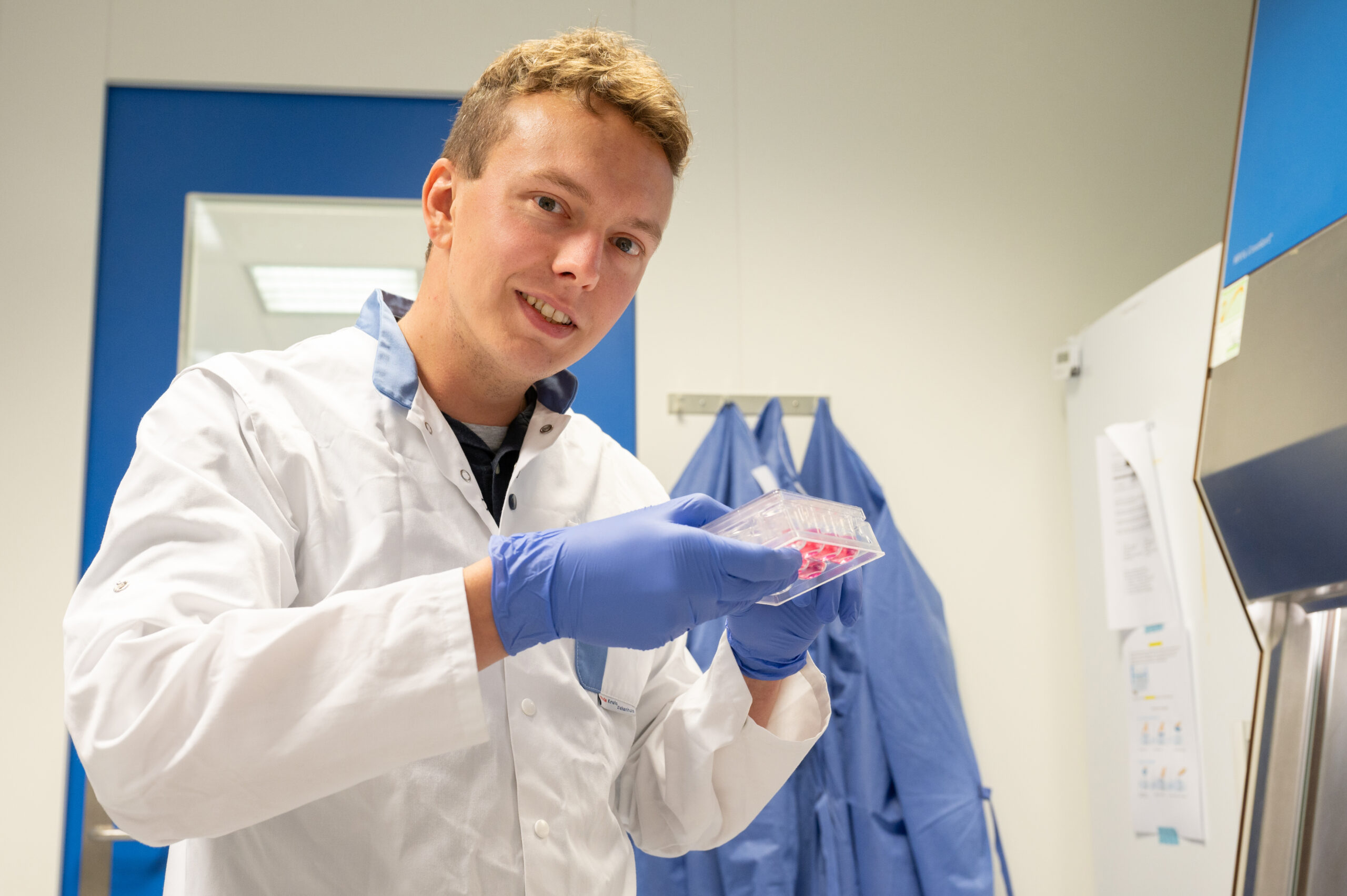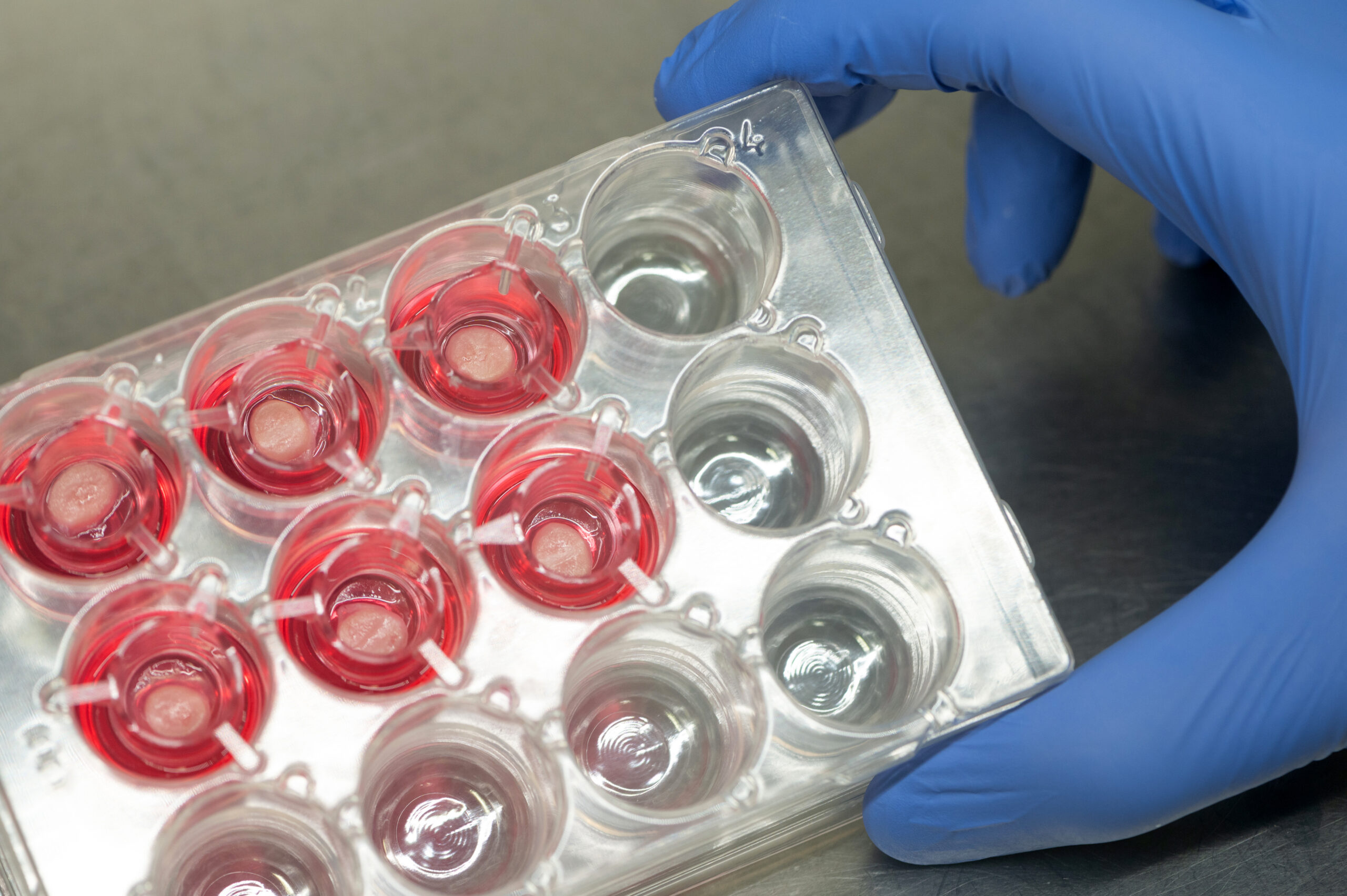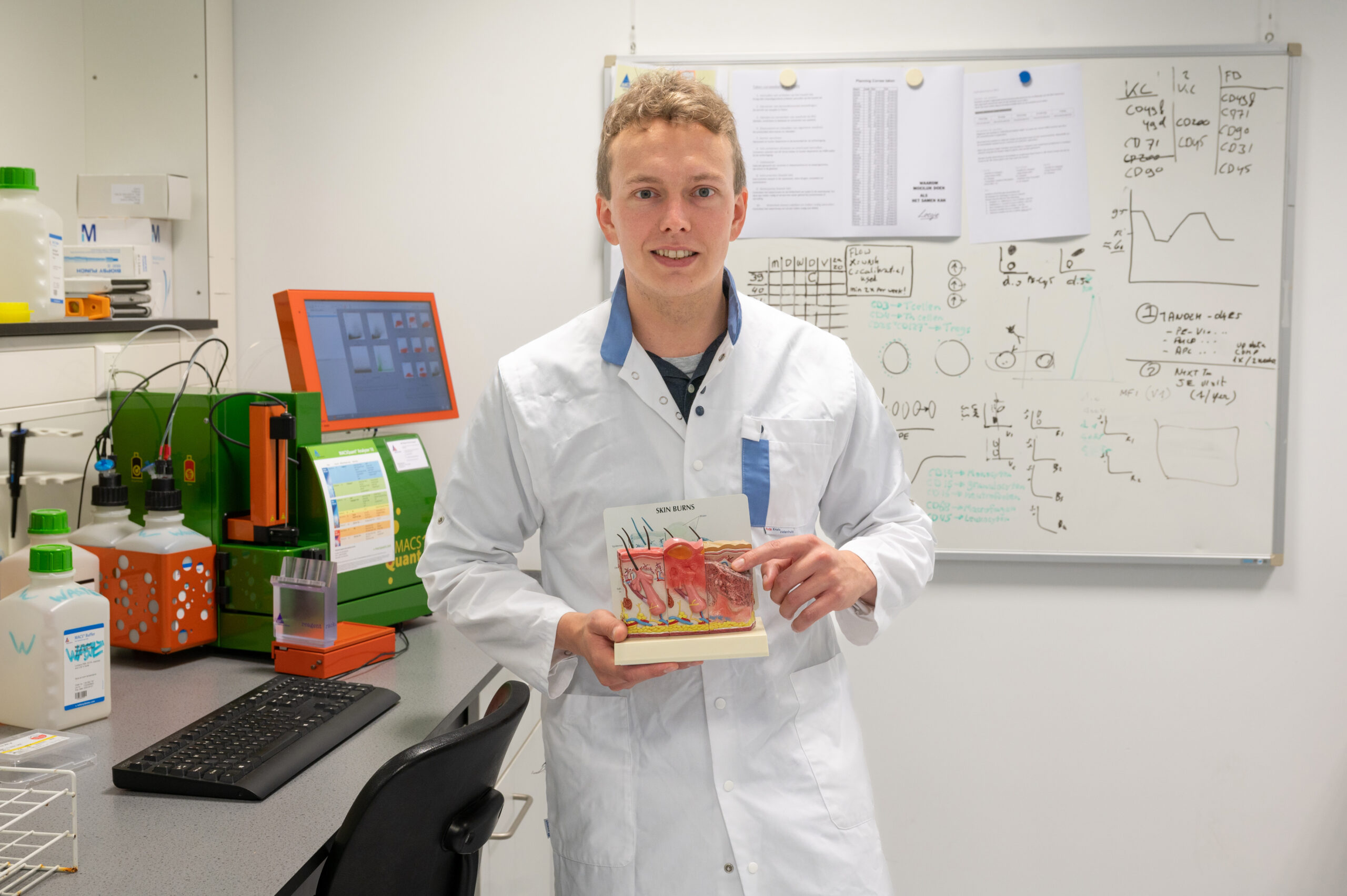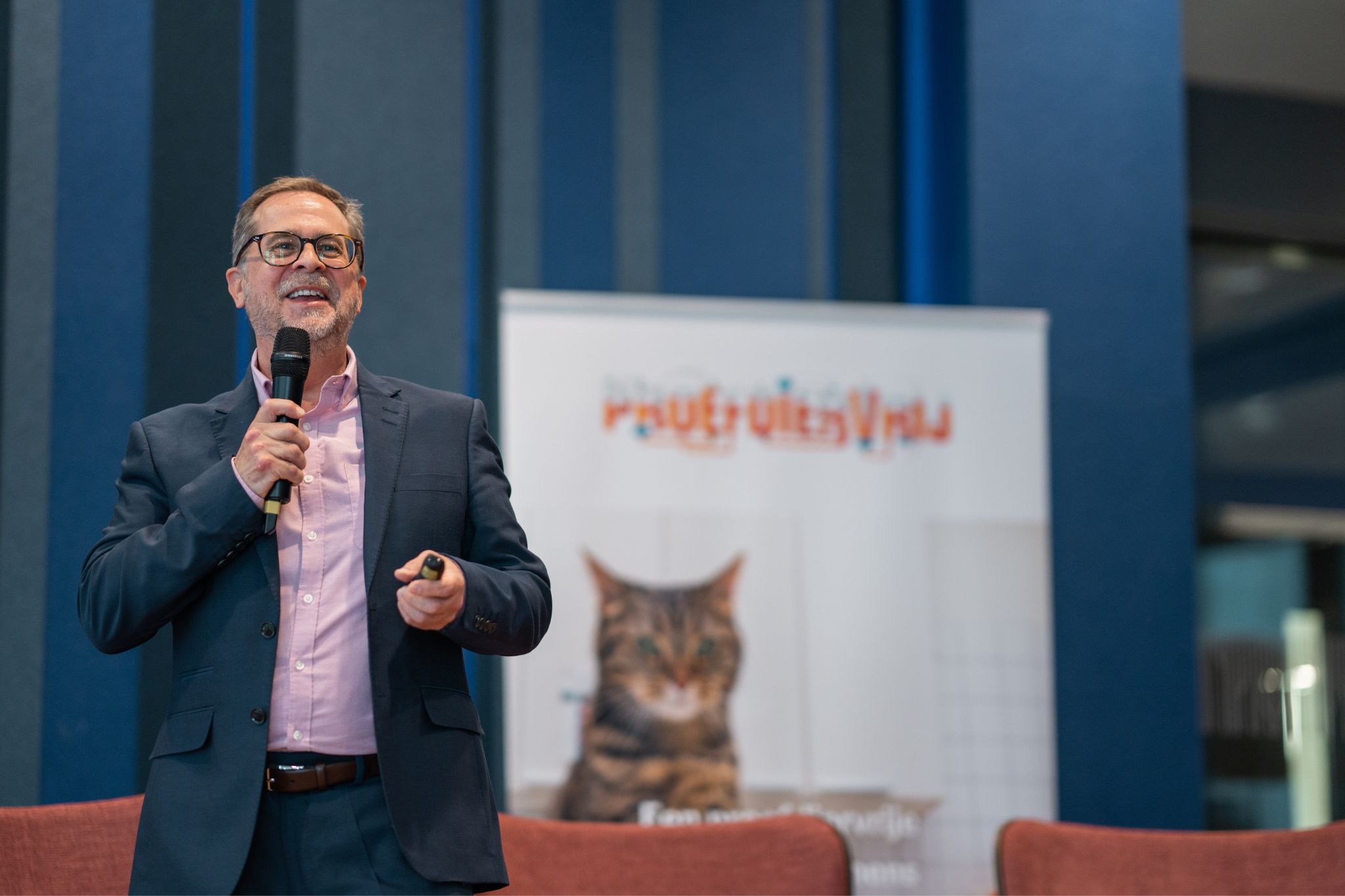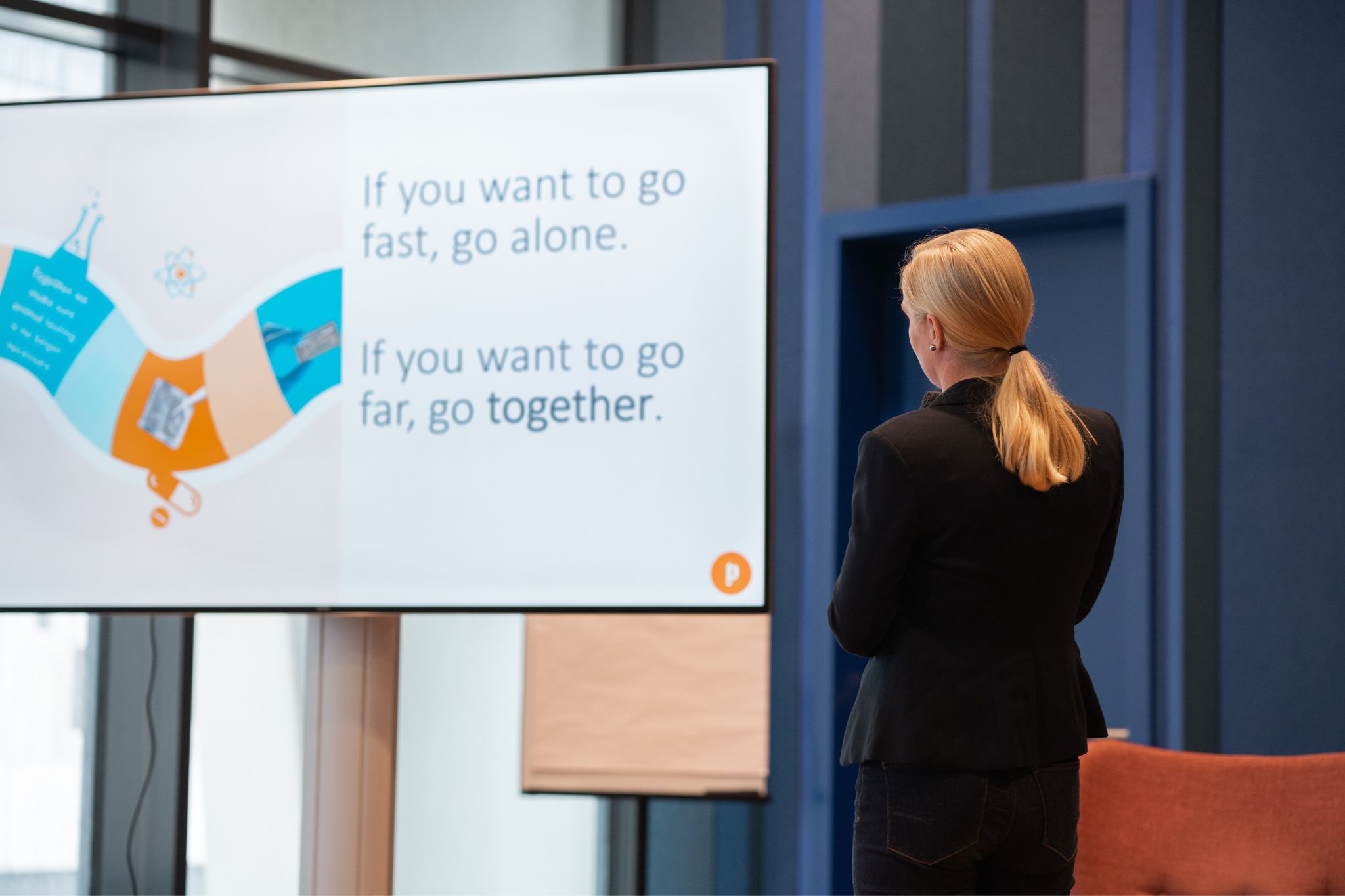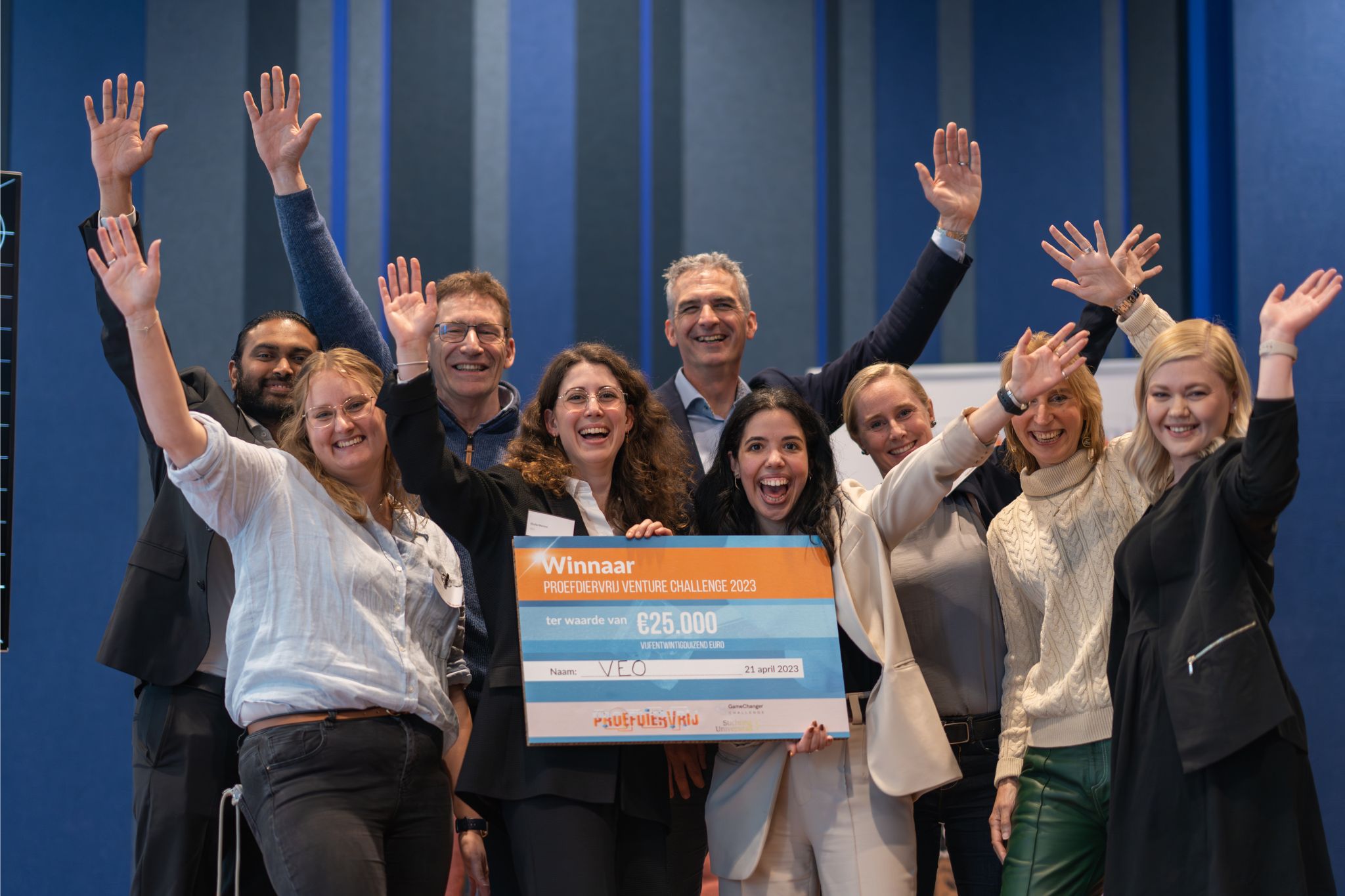This year we have once again taken significant steps towards that one ultimate goal; that fantastic moment when animal-free science becomes a reality and we can dissolve ourselves. At the end of this eventful year, we’d like to take you through some highlights. There were many, but we chose nine
1. Former lab dog Lola shone in our campaign alongside animal-free researchers.
Most laboratory animals never get a name, but the friendly young beagle Lola, found a loving home with Mascha after her “career” in a laboratory. She continued her life, which began in the service of science, in a place where her intrinsic value is recognized. Something she gladly exploits, as even though Mascha set up a warm bed for her, Lola prefers to cuddle up with her owner in bed. And, faced with that adorable face, who could say no?
Animal testing: a thing of the past
Lola not only received a name, but also made a name for herself. Last year, she starred in our campaign, “Dierproeven. Niet meer van deze tijd.” She did this with very special co-stars, namely Dr. Katja Wolthers and Dr. Abdoel El Ghalbzouri, two passionate animal-free researchers with whom we have been working happily for years. Together, they motivated a whopping 15,058 people to sign a petition urging politicians to truly invest in scientific research without animal testing.
Animals and scientists in the spotlight
The campaign allowed us to put animals and scientists on the same stage and show what is a daily reality for us: that scientists share our dream of animal-free science and tirelessly dedicate themselves to it. For our mission, for animals like Lola. And, of course, it was heartwarming to see Lola representing all those animals that would also like a warm bed (or a king-size bed) but unfortunately live in the anonymity of a laboratory.
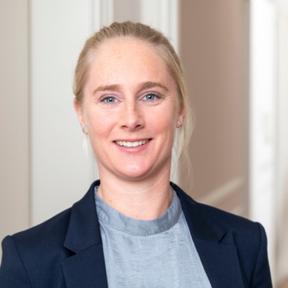
‘The campaign with Lola, Abdoel, and Katja beautifully brought together animals and science. The courage with which Abdoel and Katja stood in front of the camera once again proves that times are changing.’ – Debby Weijers, director Proefdiervrij
2. The National Growth Fund allocated €125 million for animal-free innovation.
In the aftermath of the wonderful campaign with Lola, the following happened, which should not be missing from the highlights of 2023: the National Growth Fund reserved €125 million for a New Center for Animal-Free Biomedical Translation, an initiative of Utrecht University, UMC Utrecht, Utrecht University of Applied Sciences, and the National Institute for Public Health and the Environment (RIVM). It was a crown on years of campaigning for more funding for animal-free innovation.
Accelerated transition to animal-free innovations
The new center will focus on accelerating the transition to animal-free biomedical innovations. The fact that the Ministry of Agriculture, Nature and Food Quality decided to submit this proposal is not surprising: an accelerated transition to animal-free biomedical research results in both economic and societal gains, leading to safer, more effective treatments with less animal suffering. The fact that this fantastic amount was actually reserved was not only a highlight of 2023 but also the deferred result of years of hard campaigning.
3. We were the voice of animals in places that matter.
Achieving animal-free science is not a solo effort, that’s clear. That’s why collaborations are central to our work, and it’s wonderful when new doors open. In 2023, we found new platforms where we could be the voice of animals and advocate for animal-free innovation.
Opening story Humane Measurement Models
We were super honored when the Humane Measurement Models research program asked us to open their program day. The companies, health organizations, and researchers of Humane Measurement Models aim to contribute to more effective health research through public-private collaborations, ensuring that people become less dependent on animal research. Once a year, they organize a program day for all involved parties to exchange knowledge. A breakthrough in kidney research, for example, may also have unexpected relevance for brain research, but you need to know that. Proefdiervrij is involved in eight of the twelve projects within Humane Measurement Models.
The reason we considered it a highlight to open this day is that, as an animal welfare organization, we were the first to speak in a room full of people deeply immersed in the subject. Moreover, we understand that the name Humane Models of Measurement sounds more neutral and appeals to a broader audience than the term animal-free. Our director Debby Weijers opened the day with a unifying message: look for similarities, don’t emphasize differences. Together, we bring animal-free science—or: science with humane measurement models—a bit closer.
Representatives of the Netherlands at Lush
Lush is a large international brand dedicated to producing sustainable and cruelty-free cosmetic products such as soap, bath bombs, makeup, and body lotion. Every year, the scientific branch of Lush, responsible for product development, organizes a congress. This year, we were asked to talk during a session about the state of affairs, discussing how far the Netherlands has come in the transition to animal-free science and our role as an NGO.
Our director Debby gave her talk from the office since the conference was fully online. Still, it was amazing that we were part of it. For such a large global congress where all major players are present, it’s already cool that a small country is represented. But of all the parties in the Netherlands working on the animal-free transition, we were asked to represent that small country, making it extra special. A wonderful platform to tell our story and establish new connections for future collaborations.
Dit bericht op Instagram bekijken
Informing MPs about animal-free innovation
Animal-free innovation is secretly quite a complex political dossier, involving what is allowed and not allowed within laws and regulations, what scientists can already do, and what is still being worked on. To ensure that representatives of various parties would go into the committee debate on the animal-free transition with sufficient substantive knowledge, the Dutch Parliament invited thirteen people from various perspectives to share their knowledge and vision on the animal-free transition. And we were there. Whether it was due to our contribution, we will never know, but in the committee debate that followed the discussion, it was unanimously agreed that the animal-free transition needs to be accelerated.
4. We were more visible in media
In 2023, we decided to actively seek attention in the media. It is crucial to share our knowledge and inspire people about our mission. For a fully animal-free future, we need supporters throughout society. And we find these supporters only when they know about the beautiful developments in animal-free innovation and that we no longer need animal testing.
And that effort was successful! For example, our director Debby was invited to appear on Koffietijd and on NPO Radio 1 in the program Vroege Vogels. At Vroege Vogels, Debby sat together with Katja Wolthers, who also starred with Lola in the campaign “Dierproeven. Niet meer van deze tijd.” Being able to join together made it even more enjoyable. It is the best way to show that we are carrying out our mission together with scientists.
5. We were, once again, fully supported by our donors
Let’s be honest: the support of our donors is a highlight every year. Since we are entirely funded by individuals, we are incredibly grateful for our loyal supporters. It is particularly special when donors take action for our mission. Like Sonja Tepper, who walked the Nijmeegse Vierdaagse for the fifth time this year for animals. And Marvin van der Putten, who cycled for five days to raise as much money as possible for animal-free research. It’s nice to see that children and young people are increasingly interested in animal-free innovation. They are finding us more often for presentations and internships. And if they are so engaged in animal welfare at a young age, it promises a lot for the next generation.
6. We celebrated the fifth anniversary of our collaboration with the Nederlandse Brandwonden Stichting.
The Nederlandse Brandwonden Stichting was the first health organization we collaborated with five years ago. And this year, this collaboration celebrated its fifth anniversary. Teaming up with the Dutch Burns Foundation felt logical for us then, and it still does. It is the first fund consciously dedicated to research without animal testing.
Accurate predictions
Worldwide, many animals are still used for burn research, including mice, rats, pigs, and horses. This year, we reflected on five years of collaboration in which we supported the research of Dr. ir. Fred Vermolen, who developed a mathematical model to accurately predict the healing of burns.
We don’t need a mathematical model to make an accurate prediction: that within this collaboration, we will achieve many more beautiful results. Like the research of Patrick Mulder that we are currently supporting. In a previous study, Patrick and his colleagues mapped out the different inflammatory cells in burns. With the follow-up research, they aim to better understand the inflammatory response and work towards testing drugs to control that inflammatory reaction.
7. We invested €200,000 in a groundbreaking project to use human residual tissue in research.
VitalTissue is a unique project that makes vital human tissue left after surgeries available for scientific research. They do this by connecting hospitals and research institutions. Because all that residual tissue must come from the operating table to the laboratory. Once in the laboratory, researchers use the tissue to test drugs—and that saves animals.
We are delighted and proud that we could contribute €200,000 to the whopping €1.5 million that VitalTissue received for the second phase in setting up this seemingly simple but groundbreaking logistical network. Because what is nothing more than residual tissue in one place replaces animal testing as research tissue in another place. And thus, it also provides test results that better reflect how a human body responds in practice.
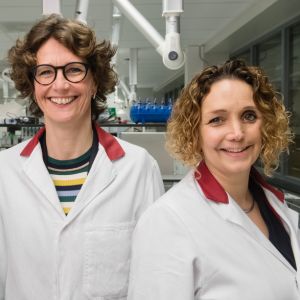
“Good access to vital human tissue is an essential condition for the development and application of existing and new research models for diseases and drug safety. With this subsidy, we can really put our ideas into practice with all those involved.” Cyrille Krul and Evita van de Steeg, co-initiators of VitalTissue.
8. We inspired a new generation of researchers to work animal-free.
For over ten years, we have been giving lectures to students taking the “Animal Experimentation” course at universities or colleges. This course is mandatory for all young aspiring researchers who want to conduct research on animals later. Being able to give a guest lecture at almost all educational institutions offering this course gives us a direct and valuable connection to the scientists of tomorrow. In recent years, colleague Janneke has been in front of the class, but as she embarked on a new challenge this year, the lectures were taken over by Anne. A great moment to critically review the content of the lectures and give them a fresh look.
We adjusted the common thread to “inspiring to work with innovative animal-free models,” an approach that seems to resonate with the new generation. And that is fantastic! Because when they want to work animal-free in the future and need something for it, they know how to find us. For example, this year, we not only inspired a student to work with a human kidney dialysis model but also funded this research.
9. Proefdiervrij Venture Challenge
Since 2021, we have been organizing the Proefdiervrij Venture Challenge, and this year’s edition was also a great success. Researchers starting a company still happens too infrequently, even though it is a fantastic way to increase the impact of the animal-free model they have developed. Often, researchers just don’t know how to approach this. And that’s exactly what the Proefdiervrij Venture Challenge is for: two three-day boot camps, coaching sessions, and a finale where teams present their start-up to a jury of experts from the scientific field and the business world, as well as to a panel of investors.
An inspiring presentation from Unilever
We present this award during the Proefdiervrij Event, an event where animal-free pioneers talk about what they are working on and take visitors through animal-free innovations and technologies. This year, our keynote came from the business sector. Prof. Dr. Paul Carmichael works for Unilever, making it extra special that he wanted to come. Even though Unilever has long been a pioneer in animal-free models, the business sector is often hesitant to come forward on this topic. His presentation was certainly a highlight for us: a sign that companies are daring to speak out that they share our mission.
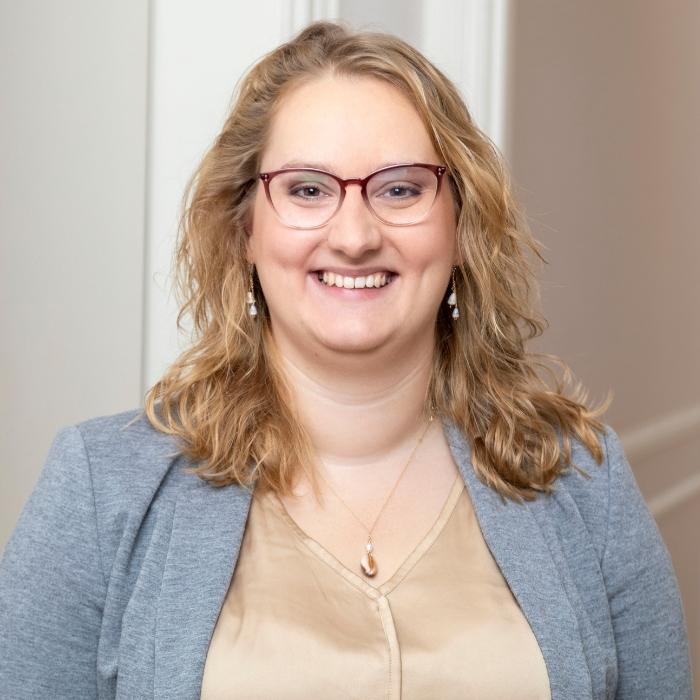
“The teams from Chiron and Insteps from the Proefdiervrij Venture Challenge 2022 have already registered as companies. And that’s exactly why we organize it.” – Saskia Aan, advisor science & innovation at Proefdiervrij
On to 2024

